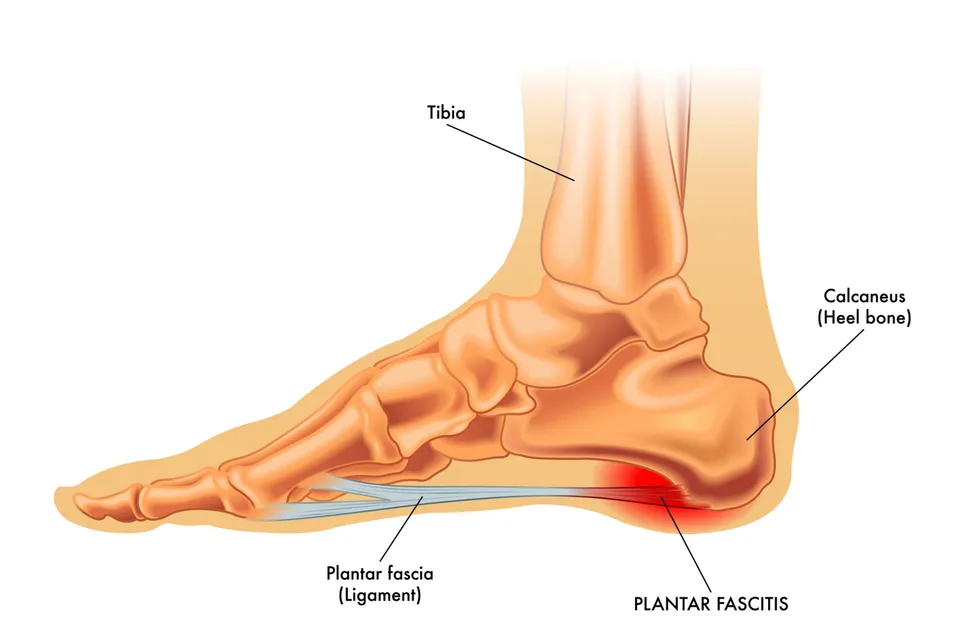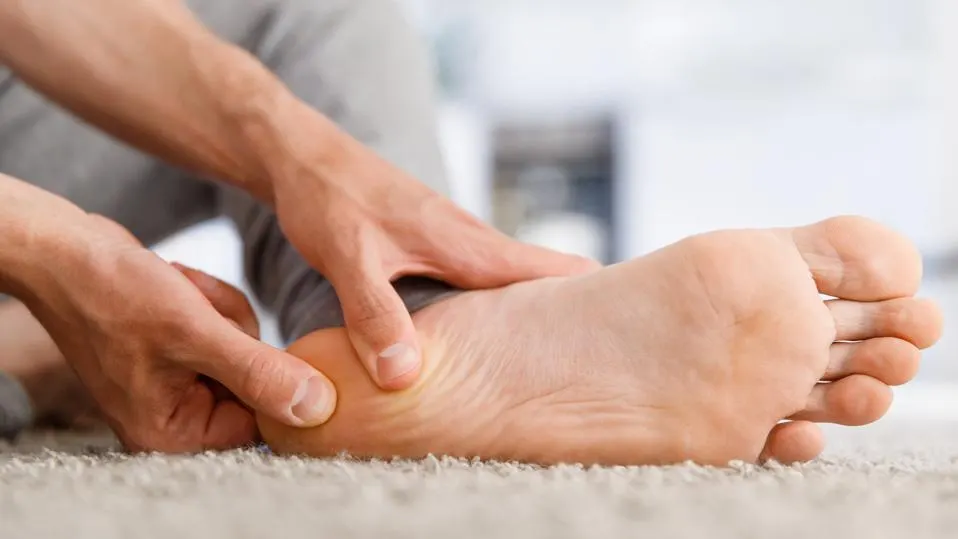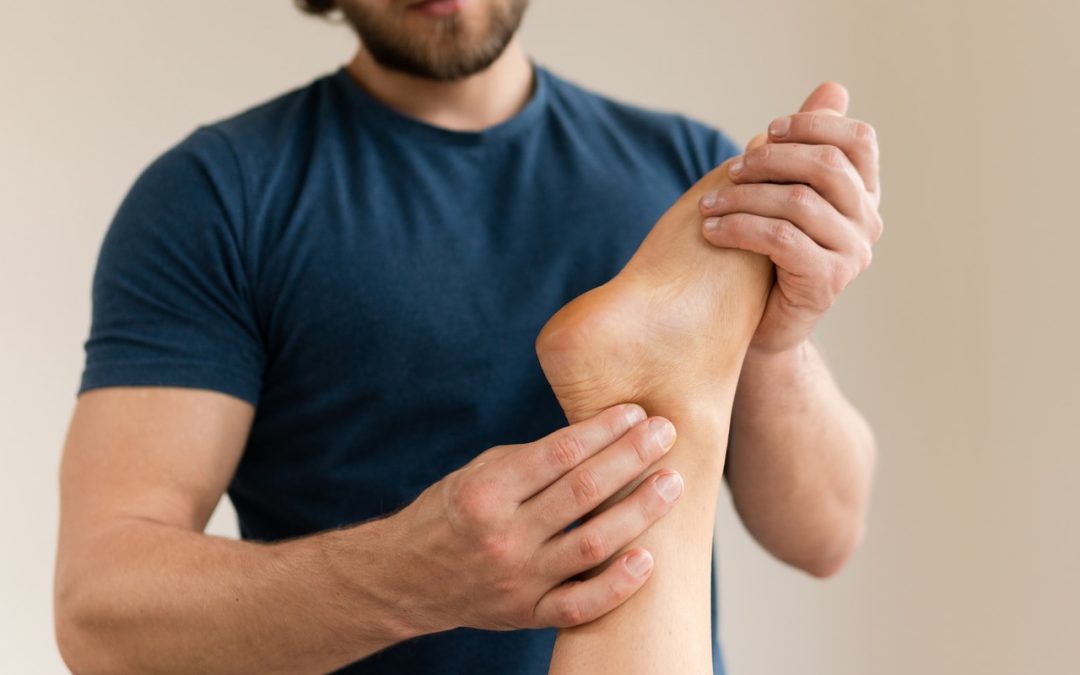Osteopath for Plantar Fasciitis
Plantar fasciitis is a common foot condition that affects many people, causing discomfort and limiting mobility. One effective treatment option to consider is osteopathy, which provides a holistic and non-invasive approach to relieving pain and promoting healing.
What is Plantar Fasciitis?
Plantar fasciitis is an inflammation of the plantar fascia, a thick band of tissue that runs along the bottom of your foot, connecting the heel bone to your toes.
The plantar fascia acts like a shock absorber, supporting the arch of your foot. When this tissue becomes strained or irritated, it can lead to painful inflammation, which is referred to as plantar fasciitis.
Signs and Symptoms of Plantar Fasciitis

The most common symptom of plantar fasciitis is a stabbing pain in the bottom of the foot, usually near the heel. It’s typically most severe:
- In the morning: After getting out of bed, the first few steps can cause significant discomfort.
- After prolonged sitting or standing: Pain can flare up after sitting for long periods or standing on hard surfaces.
- After exercise: Physical activity can aggravate the condition, though pain may subside during the actual exercise.
The pain can range from mild to severe, and in chronic cases, it may interfere with your daily activities.
Risk Factors and Causes of Plantar Fasciitis
Several factors can increase your risk of developing plantar fasciitis, including:
- Foot mechanics: Flat feet, high arches, or an abnormal walking pattern can put undue stress on the plantar fascia.
- Age: Plantar fasciitis is most common in individuals between 40 and 60 years old.
- Obesity: Carrying excess weight puts additional pressure on your feet.
- Occupations: Jobs that require long hours of standing or walking, such as teaching or factory work, increase the risk of plantar fasciitis.
- Improper footwear: Shoes that lack proper support or cushioning can contribute to the strain on your plantar fascia.
How Your Osteopath Can Help?
Osteopathy is a holistic form of manual therapy that focuses on the alignment and function of the musculoskeletal system.
An osteopath can treat plantar fasciitis by addressing the root causes of the condition, not just the symptoms.
5 Techniques Used by Osteopaths for Plantar Fasciitis:
Soft tissue manipulation
Osteopaths use massage and stretching techniques to release tension in the plantar fascia, calf muscles, and surrounding tissues. This reduces inflammation and improves blood circulation to the area, promoting healing.
Joint mobilization
If joints in the foot, ankle, or lower back are misaligned, an osteopath may use gentle joint manipulation to restore proper alignment and function. This can alleviate pressure on the plantar fascia.
Postural correction
Osteopaths assess your posture and walking pattern, providing corrective exercises to distribute weight more evenly across your feet and reduce strain.
Footwear Advice
An osteopath may recommend specific shoes or orthotics that provide better support, cushioning, and arch control, which are essential for alleviating plantar fasciitis.
Exercise Prescription
Specific strengthening and stretching exercises can help relieve tight muscles and enhance flexibility in the foot and calf, supporting recovery.

Why See an Osteopath for Plantar Fasciitis?
There are several reasons why osteopathy is an excellent option for treating plantar fasciitis:
- Holistic approach: Osteopaths focus on the whole body rather than just treating the affected foot. They assess how the condition may be linked to other parts of the body, such as the hips, lower back, or knees, which could contribute to the pain.
- Non-invasive treatment: Osteopathy offers a gentle and non-invasive approach, avoiding the need for medication or surgery in most cases.
- Personalized care: Each treatment plan is tailored to the individual, addressing specific causes like foot mechanics, posture, and lifestyle.
Contact an Osteopath on the Gold Coast
How Long Will It Take to Get Better?
Recovery from plantar fasciitis can vary based on the severity of the condition and how quickly treatment is initiated. In general:
- Mild cases: You may see improvement in as little as a few weeks with proper treatment.
- Moderate to severe cases: It can take several months for full recovery, especially if the condition has been persistent for a long time.
Consistency in following your osteopath’s treatment plan, combined with at-home care, plays a significant role in recovery speed.
Tips to Help Treat Plantar Fasciitis at Home

In addition to osteopathic treatments, several self-care strategies can accelerate the healing process:
Rest and Ice
Avoid activities that aggravate the pain, such as running or standing for long periods. Apply ice to the affected area for 15-20 minutes several times a day to reduce inflammation.
Stretching Exercises
Stretch your calves, Achilles tendon, and plantar fascia to relieve tension. A simple stretch involves rolling a frozen water bottle under your foot for a few minutes.
Wear Supportive Footwear
Ensure you wear shoes with good arch support and cushioned soles, even at home. Avoid walking barefoot on hard surfaces.
Use Orthotics
Custom-made orthotics or over-the-counter shoe inserts can provide additional arch support and relieve strain on the plantar fascia.
Night Splints
Wearing a night splint can keep your foot in a stretched position while you sleep, which can help alleviate morning pain.
Seeking Treatment For Plantar Fasciitis: A Step to Recovery

Plantar fasciitis can be a painful and persistent condition, but with the right treatment, recovery is achievable. Osteopathy offers a comprehensive, non-invasive approach that not only targets symptoms but also addresses the root causes of the issue.
By working with an osteopath and incorporating proper self-care, you can relieve pain, restore function, and get back on your feet quickly. To start your healing journey, book a consultation with the experienced Gold Coast Osteopaths at Chirn Park Health Group in Southport. Take the first step toward recovery today!
Make A Booking With A Gold Coast Osteopath Near Me
Disclaimer: The information provided in this article is for educational purposes only and should not be considered medical advice. Always consult a qualified healthcare professional, such as an osteopath or physician, for a personalized diagnosis and treatment plan tailored to your specific needs.









